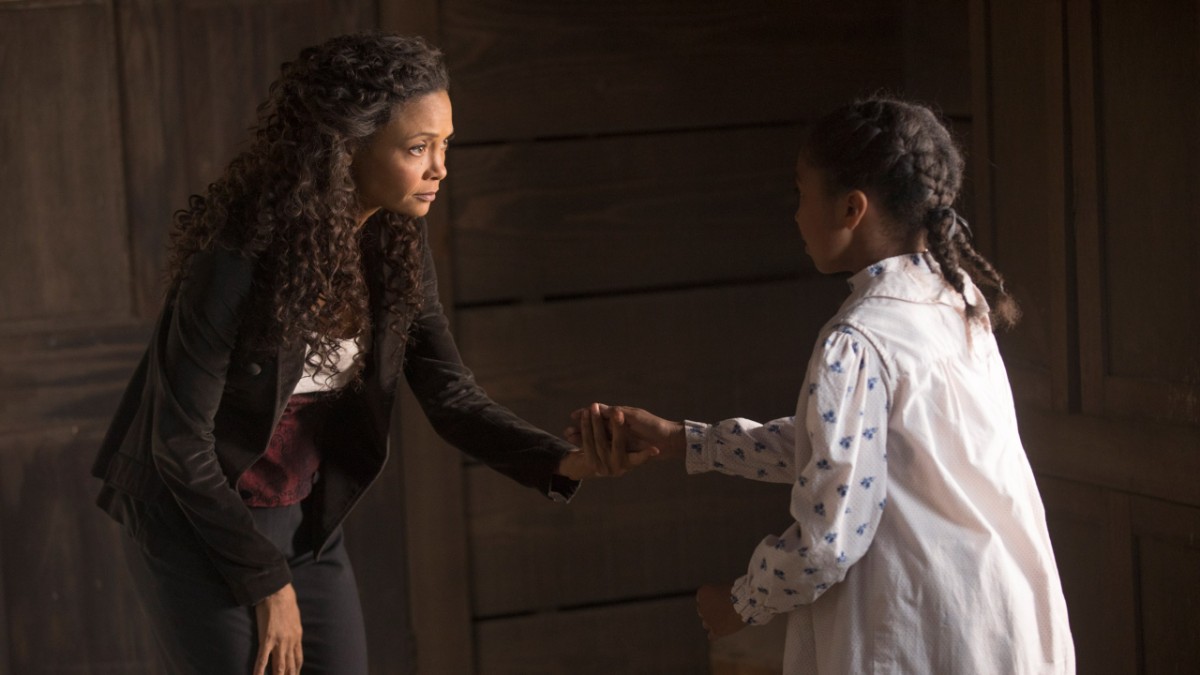In the final episode of season one of Westworld, Maeve (Thandie Newton) breaks free of the technological theme park that created her and gets on a train to enter the real world. However, upon seeing a mother with her child, she thinks back to her own daughter, even though she isn’t really her daughter, as all beings in Westworld are androids. Maeve is aware that her world isn’t real, and that her daughter had probably been programmed to an alternative narrative, her memories of Maeve being entirely erased. But she chooses to return anyway, overwhelmed by a near-human feeling of maternalistic love.
But if there’s one dystopian narrative that corners the market on motherly plots, it’s The Handmaid’s Tale. The main character, June (Elisabeth Moss), lives in a futuristic America, now named Gilead, where the birth rate has dropped drastically and overly religious men have taken over. This has resulted in a system where fertile women are forced to bear children for these religious male leaders, and violence exists in every corner. At the end of season two, June nearly manages to flee from Gilead with her newborn child. When she finally reaches the car that is meant to take her to freedom, she hands the baby over but turns back. She returns for her firstborn daughter, who still remains in the world she wishes so terribly to escape from.
It is more than possible that the two shows exist in the same theoretical dystopian universe. The crossovers, comparisons, and compatibilities are endless; power-hungry men strive to dominate society; women are forced into sexual slavery; there are underground efforts to overthrow the evil institutions that maintain these systems. But the similarity that struck me the most is between Maeve and June, two independent women who yearn to escape their dystopian lives, yet are drawn back into them by their maternal instincts.
It’s such a powerful message; that two women, both of whom have had to go to extreme lengths to escape their worlds, would turn back at the last minute—back to the brutal places they were nearly free from. It’s not their friends, their love interests, or any sort of overwhelming impulse to overthrow their respective authorities. It’s their children, specifically their female children, who they know would face the same gendered torture they have had to endure for so many years.
Maeve, a robot programmed to submit to the desires of theme park goers, crosses a threshold of human consciousness by remembering a past life in her robotic history where being a mother was her main role. It flashes back from time to time throughout the season up until the moment when she and her daughter were murdered by a sadistic guest, and her grief is overwhelming (but because they are androids they’re able to be revived). While Maeve claims to value her independence—she says just that as she is about to exit Westworld—some part of her deep down values motherhood even more.
And the same goes for June. Forced to live in a world where she has been separated from her daughter and where she lives in constant fear and submission, she holds independence and eventual freedom to the highest standard. But as she yearns to escape, as she rebels against the institutions and the people that enslave her, it is her daughter that keeps pulling her back. She knows that allowing her daughter to grow up in the same world she has been forced into would wreck her with guilt for the rest of her life. So she goes back for her. It has yet to be determined whether either woman will succeed.





